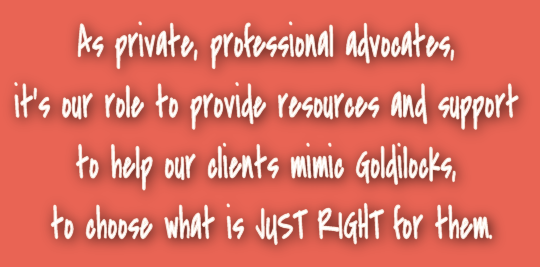Consider these scenarios:
- Scenario #1. Jane calls you, in a panic. Her mother, age 88, who lives in your city, has fallen at her nursing home. Mother Frederick has been hospitalized, but Jane can’t get there until late tomorrow and wonders if you would be willing to help her mother until Jane can get there. Of course you can! This is the very reason you are an advocate.
(Alternatively, Jane asks you to review her mother’s medical bills because she’s afraid her mother’s insurance isn’t covering everything it needs to cover. You, as a medical billing specialist, agree eagerly to help out.) - Scenario #2. You’re so excited! You’ve just learned about patient advocacy as a profession and you know it’s a perfect way for you to make some extra money. So you start asking your friends if they like the idea – they all do – they think it’s a great idea! You sit down and do the math… and decide that yup – let’s go – I’m going to be a patient advocate! You find your first client, Mr. Howard, and you help him to the max! He is thrilled with the work you did for him. You know you’ve made the right choice. Patient advocacy is for you.
- Question #1: Do you see yourself in either scenario?
So let’s continue….
- Back to scenario #1: You follow through, making sure you have all the proper signatures in place – one on the contract including an agreed upon fee, HIPAA-required signatures, etc. You make contact with Mother Frederick, visit her in the hospital, coordinate with Mother’s providers and when Jane arrives to take over, you make the transition of care to her. (Or, you meet with Mother Frederick, collect all her bills, EOBs and a copy of her coverage, then you organize all the information, correct 14 of the bills, get her balances squared away, and report back to Jane.) Once the work is done, you go back to your office, draw up the invoice, and deliver it to Jane.
- Back to scenario #2: Mr. Howard asked you to help him with a variety of things, from providing resources to better understand his COPD, to setting him up on a regimen to make sure he takes all his drugs in the right doses at the right time, to organizing his doctor appointments. All together you spend 12 hours doing work for Mr. Howard, so once you’re finished, you present him his bill – for $600 ($50 an hour.)
- Question #2: What did each advocate do wrong?
Now for the outcomes….
- Scenario #1, Part 3: Jane doesn’t pay you. She’s really REALLY grateful you did the work, and she was sure her mother would have enough money to pay you – but it turns out she doesn’t and Jane certainly doesn’t either. You send Jane AND her mother invoices, and statements, you place phone calls…. but you are simply ignored.
- Scenario #2, Part 3: Mr. Howard is so upset! He didn’t know he had to PAY you to help him! Doesn’t Medicare cover it? And – for so MUCH money? No, no, sorry. You never told him he would have to pay you – not that much. He’s sorry to have bothered you. The end. Don’t call him again.
- Question #3: What next? How can you get paid and how can prevent the problem the next time?
The answer to what’s next is: nothing. Short of taking them to small claims court, there is nothing you can do. Further anything you do at all is only going to affect any positive word of mouth about your services. You have to let it go, and just refuse to do business with them anymore. You can’t stay in business if you have clients that don’t pay you, and if you have already delivered the service and have no payment-inducing teeth, then why should they pay you?
(The one thing you might do is ask them to write a positive endorsement / testimonial of your work so you can use that in your marketing – but that’s small compensation for all the work you did, and it certainly won’t help pay your mortgage.)
The more important question is: how can you prevent either scenario from happening again?
My advice is two-fold:
Advice #1: Never EVER work without payment up front. When you are paid before you begin doing the work there is no question of what your services will cost, and you won’t find yourself working without being paid. If the work continues past your original contract, you’ll have provisions in your contract for up front payments to continue, too.
Advice #2: Charge MORE than you are charging now. Unless you have been in business for a year or more, have a client base of 10 or more people, and/or are earning six figures (meaning you have had enough experience and track record to prove you are pricing your services well), then you aren’t charging enough.
There are many problems with not charging enough. I’ve outlined the many reasons before, and they aren’t just about your own income; they have a negative effect our entire profession. No one in our profession who has any sort of positive advocacy track record should be charging less than three figures per hour from clients, and slightly less than that if another advocate hires you as a contractor. (Although, depending on the services offered, there could be a few exceptions to my rule,) 1. You are worth it. 2. You can’t maintain a business charging less, and 3. To charge less means you’re offering brand new Mercedes services at used Yugo prices – and no one will believe you can deliver. if you tell me that your experience, audiences or geography won’t support those kinds of prices, then I will tell you not to waste your time going into practice to begin with.
Here’s what disturbs me the most: most of you reading this post will ignore this advice. Then one more person will write to me to ask me how they can get paid for work they already did, or one more advocate will go into business – and just as quickly go out of business, having also gone into credit card debt to support a business that was doomed to fail from the outset.
How do I know this? Because this advice has been offered many times in many places – and yet – I still get those emails. It seems that most of us need to learn this the hard way. We seem to have a need to get burned!

Only YOU can ensure you get paid in a timely fashion, for a fair amount of money that will keep you in business.
-
-
- If you want to better understand why you need to charge more, link here.
- If you want to figure out a fair amount to charge, find the way to calculate it in The Health Advocate’s Start and Grow Your Own Practice Handbook. – or – join us at one of our APHA Business and Marketing Workshops
- If you can help others better understand this advice (maybe you’ve been burned before) please comment below!
-
. . . . . . . . . . . . . . . . . . . . . . . . . . . . . .
Share your experience or join the conversation!
LEARN ABOUT APHA MEMBERSHIP | TWITTER | GOOGLE + | LINKED IN





Great information with memorable examples
Having been burned–badly, I might add, I am finally at the point where I have to admit, Trisha is right! Get payment up front. Just do it! And it is true that low rates are bad for all of us. Yes, yes, yes!
My mentor told me to say, “How can I help you if I can’t run my own business.” It’s worked well for me. As a mentor for APHA, I always tell people to get paid upfront! I have my prices and a PayPal account on my website. After an initial assessment fee, I offer a flat rate deal so that I can do what I need to without having to go back for money over and over.